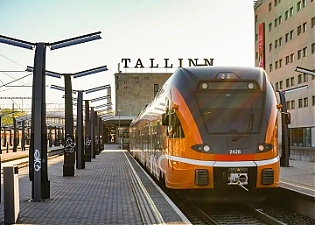Estonia, Good for Business, Markets and Companies, Railways, Transport
International Internet Magazine. Baltic States news & analytics
Monday, 23.06.2025, 11:31
Elron business passenger numbers on rise in Estonia
 Print version
Print version |
|---|
Over 200 Estonian businesses are using Elron trains on a weekly basis to link their offices located in various places in Estonia, the train operator said. According to those companies, the greatest advantage of using Elron's trains is the fact that it is possible to work on the train, as well as always being able to count on arriving on time.
Elron's sales and development manager Ronnie Kongo said that in the last five years, during which Elron has allowed businesses to conveniently pay for employee rail travel by submitting an invoice at the end of each month, the number of business travelers has increased every year, especially on long-distance routes.
"The employees of more than 200 different organisations use trains for their weekly transport. Even though use of the short-distance routes around the capital has also intensified in the last few years, most business customers use trains as means of intercity transport, which also enables them to work while they travel," Kongo said.
He added that ticket sales figures reveal that business customers usually prefer to travel in first class where they are able to concentrate on their work in a degree of peace and quiet.
Edith Vali, marketing manager at technology company Cleveron, said that as Cleveron has two offices -- a development center in Viljandi and an office in Tallinn -- the company's employees use trains very frequently, a hundred times a month on average.
"Many of Cleveron's teams are divided between the two cities, which is why almost everyone must occasionally travel from Tallinn to Viljandi or vice versa. The people in the software development, supply chain, marketing, and all of the other departments need to travel at times, so the process of commuting does not depend on one’s position," Vali said.
She added that none of the employees need to travel between the cities on a daily basis but, two or three times a week, they start their working day on a train or finish the day on a train to get back home.
"We prefer trains because even though it takes two hours to get from the capital to Viljandi, this time can be used as part of the working day, as it is easily possible to carry out normal office work on a train. We only hope that the Wi-Fi and mobile connections will get even better in time," Vali noted.
- 28.01.2022 BONO aims at a billion!
- 13.02.2021 Моя жизнь в газете. Очерки по новейшей истории Латвии. Глава 1
- 30.12.2020 Накануне 25-летия Балтийский курс/The Baltic Course уходит с рынка деловых СМИ
- 30.12.2020 On the verge of its 25th anniversary, The Baltic Course leaves business media market
- 30.12.2020 Business Education Plus предлагает анонсы бизнес-обучений в январе-феврале 2021 года
- 30.12.2020 EU to buy additional 100 mln doses of coronavirus vaccine
- 30.12.2020 ЕС закупит 100 млн. дополнительных доз вакцины Biontech и Pfizer
- 29.12.2020 В Латвии вводят комендантский час, ЧС продлена до 7 февраля
- 29.12.2020 Latvia to impose curfew, state of emergency to be extended until February 7
- 29.12.2020 Linde Gas открывает завод в Кедайняйской СЭЗ








 «The Baltic Course» Is Sold and Stays in Business!
«The Baltic Course» Is Sold and Stays in Business!

